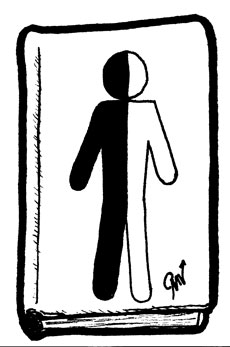Opinion: Bookmarks of social change

Tim Eggerding
January 17, 2005
In this country racial divisions determine where we live, where we go to school, and how we voted last November. After all, 62 percent of the white male vote went to Bush, whereas 88 percent of the black vote and over half the Hispanic and Asian votes went to Kerry. This suggests that we need to rethink how often, if ever, we listen to one another. Somewhere along the way, we’re missing each other, each side failing to understand the other side. When political analysts suggest that we need to heal the rift, bring this country together, they refer to red and blue states and not necessarily to whites and minorities. However, a truly United States requires communication between different races and ethnicities, communication I believe begins with literature.
The best books are the ones that tell you what you already know. Case in point: for a long time, my favorite book was Louisa May Alcott’s Little Women, a novel about four sisters growing up. I myself have five sisters. See where I’m going?
Another one of my favorite books is Black Boy by Richard Wright, a book that a white girl from the suburbs shouldn’t be able to relate to. I remember the first time I read it, as an assignment my sophomore year of high school. I recall a girl in my class saying to me, “Why are we reading this? We’re not black.” Indignation swarmed in my stomach, and I stared at her unable to find the words that now come to me: no, we aren’t black, and that’s exactly why we’re reading this.
We’re reading this so we can better understand the lack of opportunity and dignity afforded to minorities in the Jim Crow era. And we’re reading to begin to understand the action that must be taken to clean up, the best we can, the sins of the past. We can’t do this without knowing how it feels to suffer under those actions.
After I read Black Boy to begin to understand what it is like to be black, I read to realize the common humanity beneath racial differences. I cried through that entire book, sometimes out of outrage at injustices, but usually because Richard Wright understands that “if this country can’t find its way to a human path, if it can’t inform conduct with a deep sense of life, then all of us, black as well as white, are going down the same drain.” In Wright’s search for identity, I can see myself searching for who I am. I can see all of us searching to find who we are as individuals and who we are as a people. In that way, Richard Wright tells me what I already know.
Get The Daily Illini in your inbox!
If we don’t like to live together maybe we can at least agree to read about each other. To understand the fight for gay rights, pick up Alice Walker’s The Color Purple. Perhaps in your own experience with religion, you’ll relate to Celie and Shrug’s search for and discovery of God in nature and love. If you want to understand why women demand abortion rights, grab Margaret Atwood’s The Handmaid’s Tale and you’ll discover within Offred’s struggle against a patriarchal takeover your own qualms with gender roles. If you don’t agree that affirmative action is necessary, then find anything by Richard Wright or James Baldwin to understand what it’s like to belong to a race without institutionalized power. You’ll see your own confusion and anger and attempts to discover individuality reflected in their struggle for civil rights.
I am convinced that the remedy for our lack of interracial communication and understanding begins at the library. There we can begin to gain empathy for those unlike ourselves, but more importantly discover that we’re really not so different after all. Pick up a book about someone else, and I promise you’ll find yourself.
Therese Rogers is a sophomore in LAS. Her column appears Mondays. She can be reached at [email protected].






